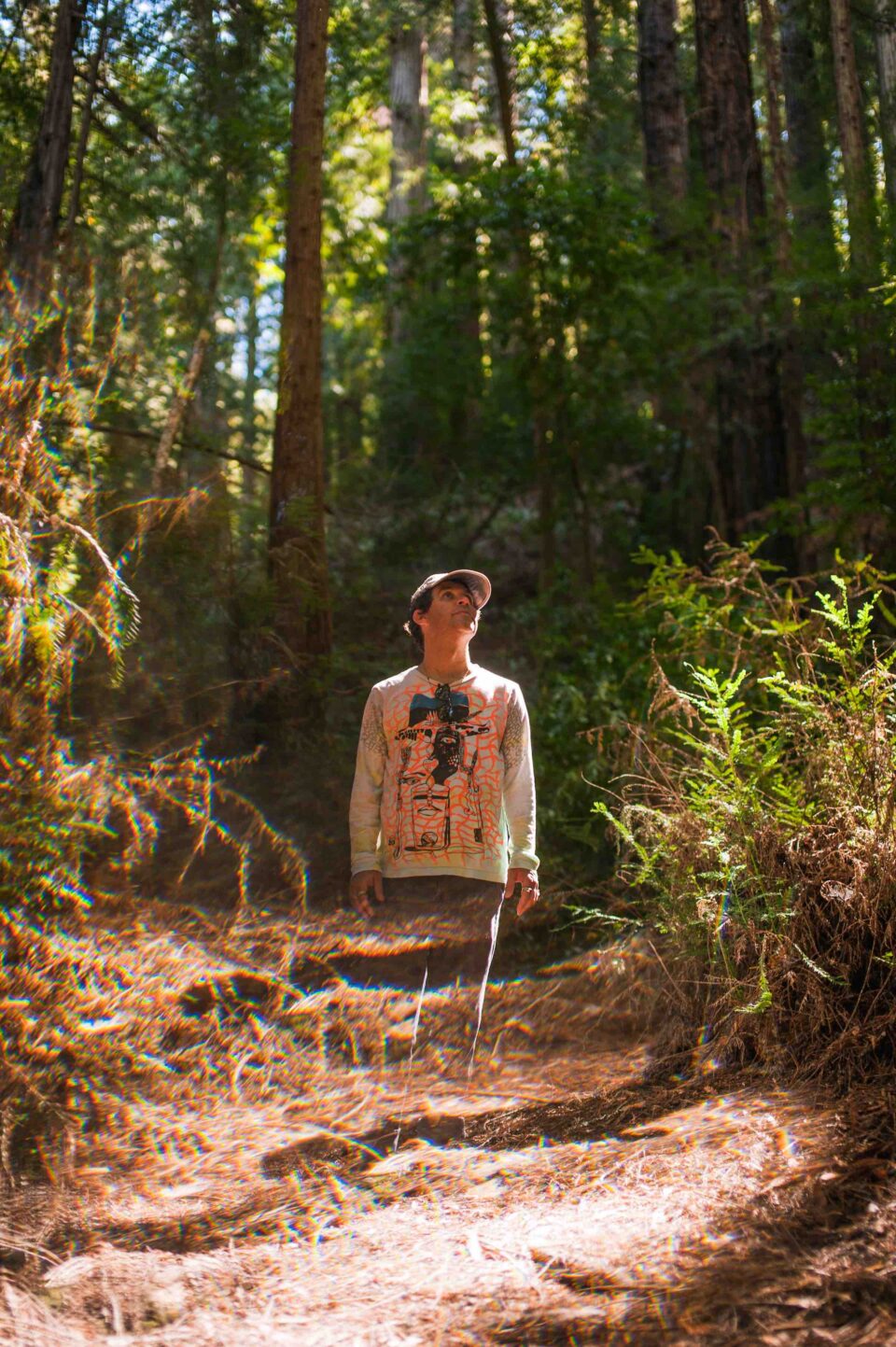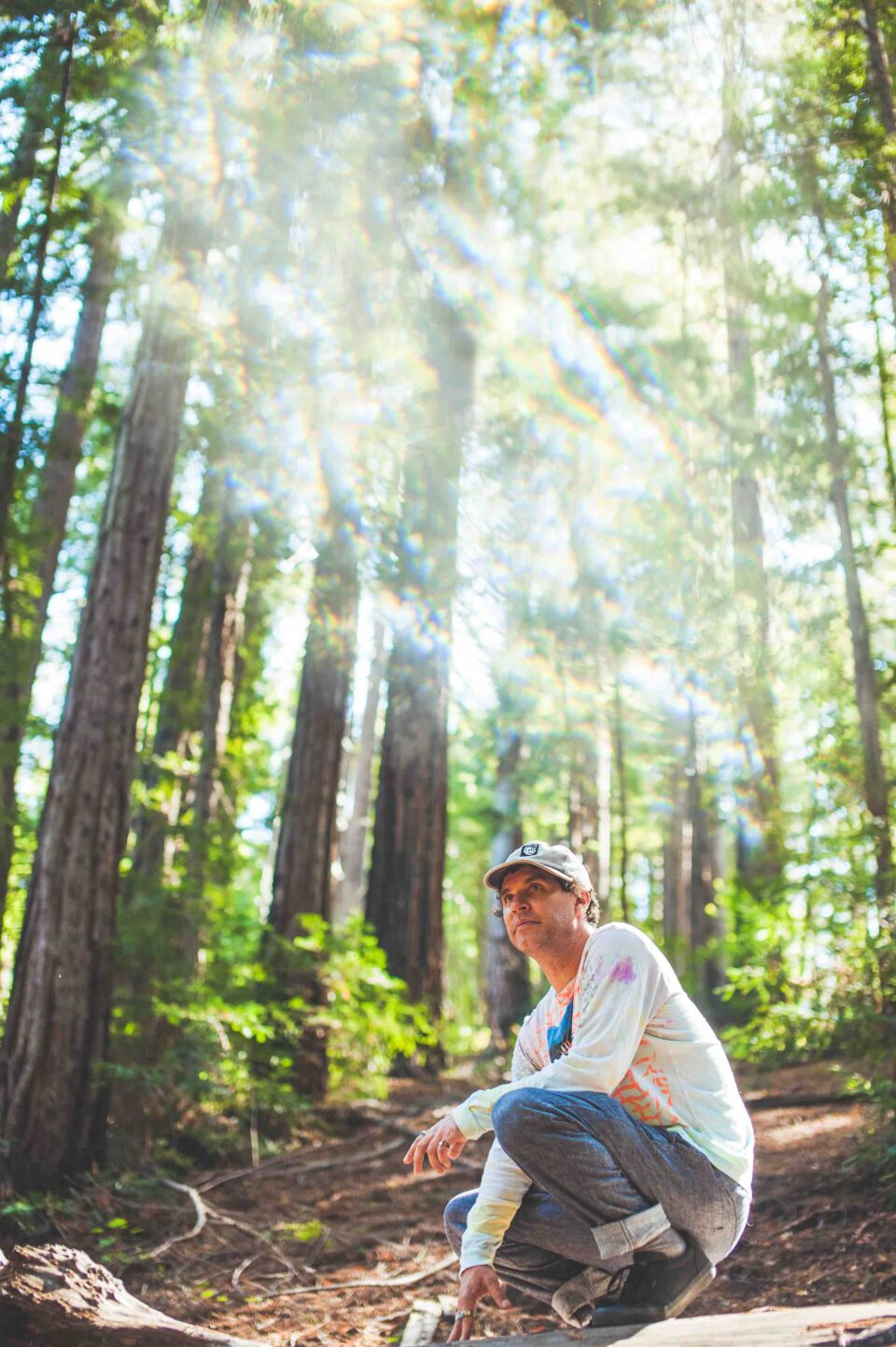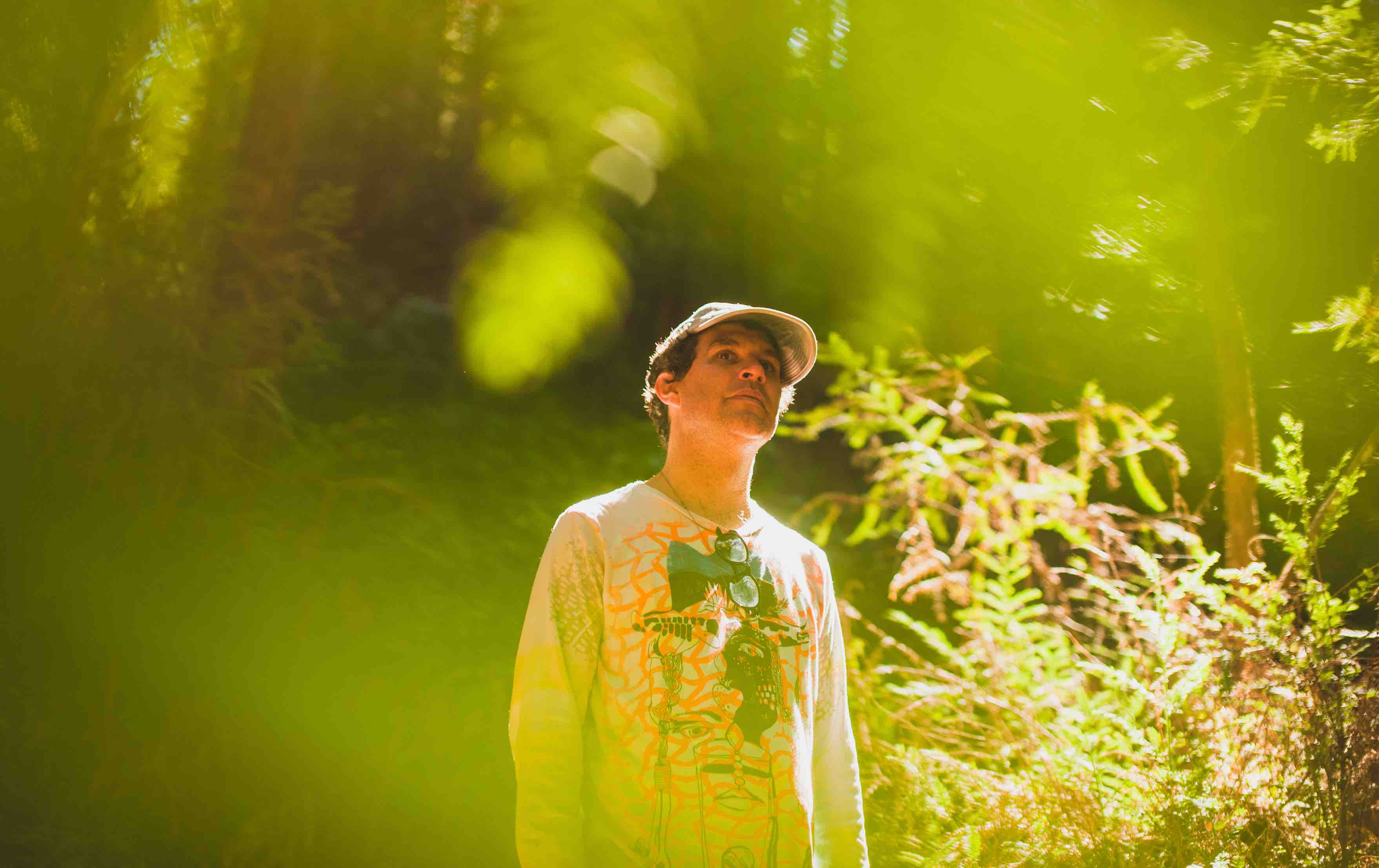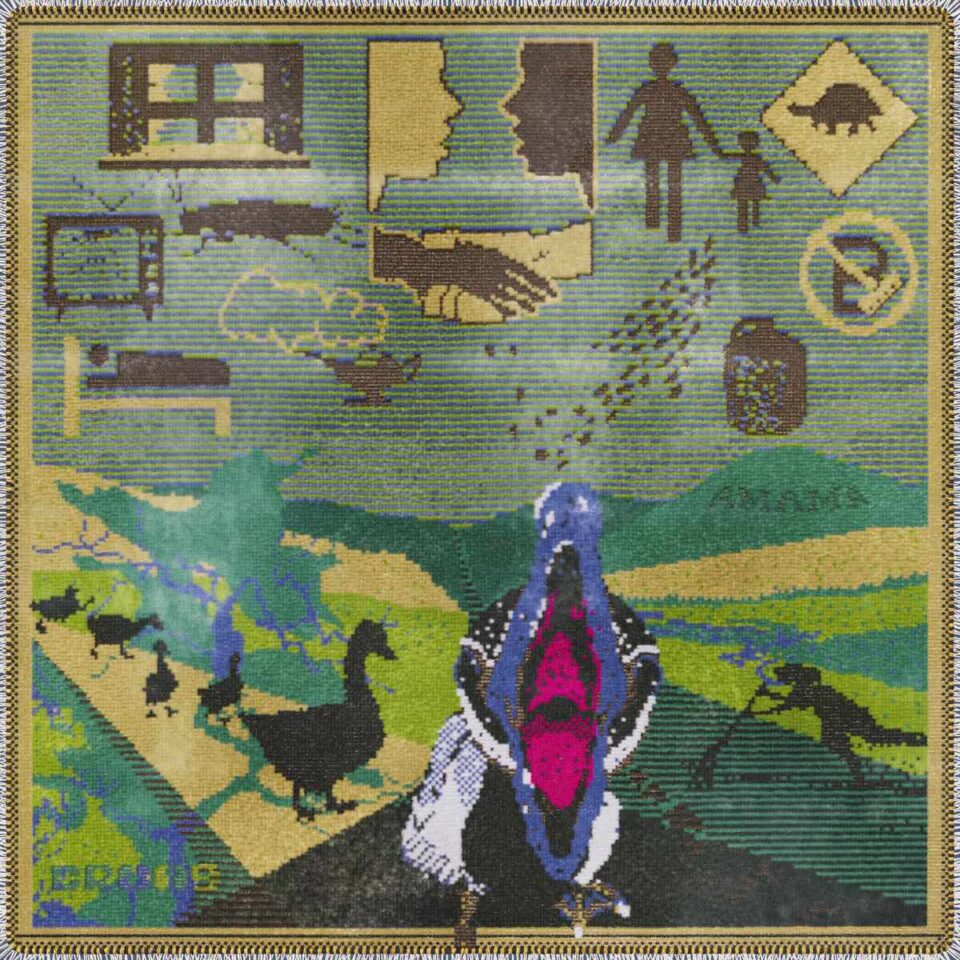For any artist who thrives on the creativity that comes from being around others, involuntary and prolonged isolation can be a seismic blow. For Avey Tare (a.k.a. Dave Portner), best known as one of the songwriters and vocalists in the Baltimore-bred indie-psych band Animal Collective, the solitary life of the early COVID pandemic was just that: an extended separation from communities interpersonal and musical that he still finds himself reckoning with.
In the midst of it all, Avey sought to rekindle the connections he had been deprived of while recording Animal Collective’s Time Skiffs, and developed a group of solo songs with producer Adam McDaniel at Drop of Sun recording studio in Asheville, North Carolina. The result is 7s, Avey Tare’s meditative fourth solo album, bursting at the seams with the yearning for interconnectivity that fueled its recording.
In chatting with Avey about 7s, he tells us all about how drone music, intentional stillness, and the innate need for community fed into one of his most human releases to date.
It sounds like a lot of what drove this album was the sense of isolation you felt in recent years. How do you see that coming across in a solo release?
Going into it, the process of collaborating with somebody and getting that connection going was the goal. In my isolation during the quarantine period, which is when all but one of the songs were written, I rediscovered this deep desire to be around people, and realized how important that is for me, even though I can be a very reclusive person a lot of the time, especially when I’m working on music. Here and there, that bleeds into the lyrics of 7s—relationships and the sense of wanting to be around a person.
I feel like “Invisible Darlings” and “Lips at Night” get that across especially well. Was that something you wanted to express by having the record lead with those two?
I’m always working with balance. The first three songs really bring in the positive aspects of getting to be so internal for some months—all the positive things that came out of me that I was understanding as I was writing and putting this stuff together with Adam McDaniel. And then it goes into darker territory, which is just me going deeper into the reality of what’s happening inside myself.
“I want you to travel somewhere. I want you to be surprised as the music unfurls.”
The record ends on its most sonically downbeat song—what does it mean for you to start 7s so bright, but end on a note like that?
I can be a brutally honest person sometimes, and maybe I’m just leaving it at where the reality of things are. It’s a very dark song to me, and it’s probably the most chaotic song in some respects—there’s a lot about dealing with death and rebirth. In terms of the listening process, which is usually where my first intuitive thought about album sequencing comes from, that just seemed to be the song that ended things the best. Maybe it was a little bit subconscious—a message I was trying to get across.
There are fewer songs on 7s than on your other albums, and it includes two of your longest solo songs to date. How did your circumstances affect how you let those longer songs unfurl?
I wrote “Hey Bog” for some solo shows I was doing at the end of 2019. When I write a song with Animal Collective or solo for a live set, that becomes the song for me—the way the song unfurls in the live setting. The initial energy of that is often what I want to capture. I didn’t really think about recording that song for a while, but I was pretty aware that I wanted to work on it like I was playing live, like it was part of a set.


There’s often a lot of transitioning and intros and outros during my live performances, and I wanted to capture that vibe with it and make it feel like more of an extensive sonic journey. I’ve been a fan of that kind of songwriting for a long time, going back to Spirit They’re Gone, Spirit They’ve Vanished, which was my first real attempt at capturing my songwriting style—“Alvin Row” is like 12 minutes long. I think it’s just in line with what I enjoy: music being a journey to listen to. I want you to travel somewhere. I want you to be surprised as the music unfurls.
With “Sweeper’s Grin” it was a little different, just because I never played that one live. When I started actually writing “Sweeper’s Grin,” it just felt like this chord that could trance somebody out and take you on a journey in its own right. It was kind of hard for me to not just let that song go for a while, in the same way “Visiting Friends” on Sung Tongs is to me—I wanted that to be this very lengthy trance drone excursion.
“I find that the drone really takes you somewhere, and it’s always fascinating to me how something so minimal can expand so much and become so much larger than it actually is.”
What appeals to you about putting a listener in that state of trance?
Stillness is very important. I do a lot of things involved with meditation and breathwork, and I’m really into drone music for that reason. I find that the drone, in its best form, really takes you somewhere, and it’s always fascinating to me how something so minimal can expand so much and become so much larger than it actually is. It all just comes down to our state of mind and the ability to practice stillness and just listen.
Some of these tracks are centered around unique recording experiments, like “Lips at Night” using the sound of a pitcher throwing a baseball into a glove from a floor above. What was the appeal of incorporating that?
I have a history of being very picky with percussive sounds. Musically, I come from a place where I was forced to have an acoustic guitar and then use whatever else was around to create percussive sounds—like plates, or whatever would be in my little apartment that we used to jam in. On one hand, it was keeping with that mentality. I went into the studio with Adam and didn’t take anything of my own in there other than my guitar. I was leaving it up to the experiment of it all to see what we could come up with from the ground up. Drop of Sun is a great studio and Adam has a lot of sweet gear, so it’s a different vibe than playing in a bare apartment, but I think there’s always this sort of drive for me to say, “What’s a cool sound?”
I’ve been thinking about how the lyrics to “The Musical” could be read as a song about your writing process. How did you see that one fitting in with everything else?
I wanted a lot of the album to, lyrically and vocally, sound kind of conversational. I keep bringing up Dory Previn—her style is very spontaneous-feeling. I had seen an interview with her where she says she wants her delivery to feel like it’s something coming off the top of her head as she’s singing it. I wanted that relaxed feel. I was also influenced a bit by J.J. Cale and his more intimate recording style, so I wanted the vocal flow to feel like I was having a conversation with the listener, saying how I felt about where my thoughts were with making music.
Interpersonal connection has always felt like a major theme in your work. How has that concept evolved for you over time, especially given how these connections have intrinsically shifted over the past few years?
I’ve just worked on being a lot more open and honest with people. In my younger years, there was a lot of me that was very closed-off. I devoted a lot more of myself and certain feelings into art or music, and kind of left it at that as my outlet. Because of the challenges I’ve had with certain relationships over that time, there’s been a lot of work that I’ve done trying to open up and putting a lot more of myself into relationships and connections. I’ve been very focused on seeing how deep I can really get with people to take things to this amazing cosmic level—great friendships and great community. I think community is very important and a saving grace, especially in these times.
“A lot of musicians feel like they’re on their own journeys, having their own struggles. While we are uniting in a lot of areas, I feel that the music industry is still lacking this overall sense of community.”
How have you felt the process of 7s affecting the ways you’ve been reflecting on all this?
It definitely makes me think a lot about my place in the music industry. I feel like the industry—especially for musicians—should be a community, and should be something we’re all invested in. In the same light, it should be something label people and managers and [all those people] are invested in. We’re all a part of this thing, working together. I can’t necessarily say it feels that way right now. It feels very disparate. A lot of musicians feel like they’re on their own journeys, having their own struggles. While we are uniting in a lot of areas, I feel that the music industry is still lacking this overall sense of community.
Being able to make music on a smaller, local level is really important for me. I like being able to make something weird or crazy that might not necessarily be involved with Animal Collective, and still be able to do something with it. That has a lot to do with the community that I’m in and the like-minded people around me. Being able to take that and integrate it on a larger scale is something I’m working on along with trying to progress music for myself. FL










